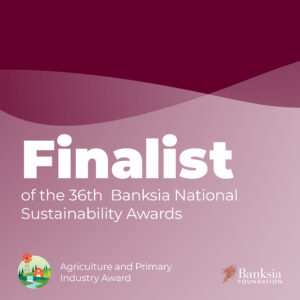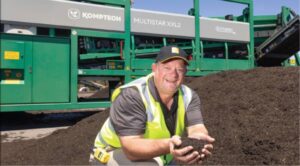For many gardeners combining the words fertile and soil in a West Australian context is a bit of a dream. W.A. sands are considered among the least fertile soils on Planet Earth. Specifically the formations known as Bassendean sands take the cake in infertility. These grey sand areas are found inland from the coastal belt. They’re characterised by Banksias and have a low pH or in other words, are acid reacting. Closer to the beach we have other sand formations that can be highly alkaline due to the presence of limestone and capstone.
Our brilliant wildflowers are able to cope with not only our peculiar climate but also with low nutrient soils. This, in part, has driven differentiation and the wonderful wealth of over 12,000 species in WA makes us a real diversity hotspot in the world.
However when you want to grow high demand vegetables, fruiting trees or lawn in your home garden then our native soils need a fertility boost. Curiously many of our Australian native plants respond well to compost addition when planting, as Jackie Hooper of Zanthorea nursery was telling me recently. She recommends her customers plant year round when it suits them and that compost be added to the planting hole as preparation. How can we do this in an effective way that doesn’t result in excess nutrients hitting waterways, rivers or underground aquifers?
A range of new, refined composted products has just become available to home gardeners, which aims to address this question. These complex carbon materials are known as mature composts. They work in a profoundly different way to such soil improvers as animal manures, less mature composts and even traditional fertilisers. First of all they don’t so much fertilise the plants, instead they feed the soil and the living organisms that reside in it. The vital link here is effective carbon. How does this work?
Plants are unique organism that can manufacture food from light through the process called photosynthesis. The simple foods produced are most easily understood as sugars but are in fact carbon based molecules. These sugars are used by the plant to build its own structures – leaves and stems as well as roots. Its at the root level that the most interesting things are happening. These sugars are exuded into the soil through the fine feeder roots.
A myriad of soil dwelling organisms take up this carbon and it is primary food for them, as unlike plants, they cant make their own so they depend on their relationship with plants for the life giving supply. The biodiversity of soil organisms is so huge we cant get our head around the numbers. One example – two handfuls of soil contain more organisms than there are humans on the planet so that’s a minimum of 7 billion.
These microbes, fungi, nematodes and all the rest of them, work day and night to supply their host with the necessities of life including moisture and minerals, as raw materials for growth. They have also evolved many strategies for protecting their host from attack by insects and disease. Sting nematodes and turf disease as well as clubroot disease in cauliflower crops have been stopped in their tracks by applications of mature compost .
When you add a mature composted product to the soil you are feeding the soil organisms a form of effective carbon which we also call humus. This food makes the world go around under the soil surface. Biology in its many forms and considerable numbers, comes in to supply plants with most everything they need to grow.
This highly stable composted material is made from a number of ingredients including by-products from agriculture, and organic wastes from business and the community, so there is a good story to be told about rescuing resources from going to landfill and recycling the carbon back into the soil.. It differs from less mature compost in a raft of ways. While it has plant nutrients it releases only minute quantities in a directly available form. The biology it fires up does most of the nutrient supplying.
The increase in water holding capacity is dramatic. Mature composts can hold more than double that of immature compost. The major benefit of this increased capacity to hold moisture comes when there is a drought or sprinkler malfunction on a hot day. Many commercial growers report reduced plant stress in crops treated with mature composted products.
Mature compost makes conventional fertilisers work better and longer. You can easily slash your initial fertiliser applications in half. Monitor growth before applying additional fertiliser and see how long the green effect lasts.
C-Wise have just released three bagged products using mature composted material. These are available to home gardeners from soil yards mostly. Humicarb is a soil improver for preparing sand prior to planting a wide range of plants and well as a maintenance mix applied to the soil surface as a sort of feeding mulch. Humiclay is a unique blend of mature composted material, Bentonite clay and zeolite. This is a brilliant foundation soil improver that delivers the additional moisture and nutrient holding capacity to soil as a preplanting mix. Turf perfect is a finely screened or sieved compost product that can be applied to turf as a thin top dressing to help grass recover from heat stress as well as excessive wear and tear.

Rockmelon crop Kunnunurra

Home made compost







